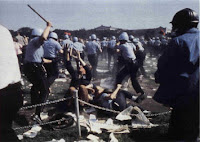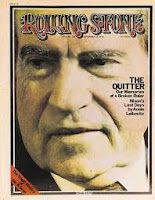 I was going to put a
spoiler alert at the top of this page, but since according to media I
am the only adult in Britain who didn't watch the final episode of
Bodyguard last Sunday and then spend all day Monday chatting about it
on the metaphoric water-cooler that is social media, I don't feel I
have to bother. So let me say that I was both disappointed and
relieved that Julia Montague's death didn't turn out to be hoax,
which would have been daring but also a twist too far. Of course
writer Jed Mercurio, having killed off his lynch-pin character, had
to twist like Chubby Checker to try to keep things interesting and
watchers' brains spinning.
I was going to put a
spoiler alert at the top of this page, but since according to media I
am the only adult in Britain who didn't watch the final episode of
Bodyguard last Sunday and then spend all day Monday chatting about it
on the metaphoric water-cooler that is social media, I don't feel I
have to bother. So let me say that I was both disappointed and
relieved that Julia Montague's death didn't turn out to be hoax,
which would have been daring but also a twist too far. Of course
writer Jed Mercurio, having killed off his lynch-pin character, had
to twist like Chubby Checker to try to keep things interesting and
watchers' brains spinning.
Keely Hawes'
departure left a hole to fill which was not quite filled by the Ipad
filled with 'compromat'. As an aside, I think 'Compromat' ought to be
the name of the next TMZ-style website that comes along. But an Ipad
can't do what Hawes does, like stand in the doorway playing with
herself. Theresa May and Amber Rudd, eat your hearts out.
At that point the
focus of the story fell directly on conspiracy, and DS Budd's
personal life dropped into softer, if still monomaniacal, focus.
Which is sort of good, because the need of Richard Madden's
performance to extend to a second dimension is thus minimised. Madden
has the poker face required of a bodyguard. He has the determined
poker face required of a cop/soldier on a mission. He has the puzzled
poker face of a victim of a conspiracy. And he has the pained poker
face of a suffering war veteran who's seen too much. And the
frustrated poker face of the damaged husband trying to deal with wife
and kids.
 In the final episode
we got all those faces at once in the key scene, an extended etude on
the theme of defusing a bomb, which includes a bizarre march across the city
to his flat, with his estranged wife by his side so no one will shoot
him. The problem is bomb diffusing stories, always cliched in
suspense terms, have basically two outcomes. You snip the wire
and....bam, you're dead. Or you snip the wire and you're not dead,
then you can jump over the convenient wall all the cops have
conveniently retreated far enough away from to make escape convenient. But without it you would have missed Madden walking through the streets with a bloodied face in a serape, like the Man With No Name, rather than the Man With No Expressions.
In the final episode
we got all those faces at once in the key scene, an extended etude on
the theme of defusing a bomb, which includes a bizarre march across the city
to his flat, with his estranged wife by his side so no one will shoot
him. The problem is bomb diffusing stories, always cliched in
suspense terms, have basically two outcomes. You snip the wire
and....bam, you're dead. Or you snip the wire and you're not dead,
then you can jump over the convenient wall all the cops have
conveniently retreated far enough away from to make escape convenient. But without it you would have missed Madden walking through the streets with a bloodied face in a serape, like the Man With No Name, rather than the Man With No Expressions.
OK. So far so good.
But from the moment Julia was killed, we, knowing we had a
conspiracy, knew it had to involve some combination of political
plotters (either to install Julia as PM and/or to oust the PM) MI5
plotters (to install Julia with her surveillance friendly bill) or
police plotters (to avoid Julia and MI5 taking away their own
repressive powers?). That last one never made much sense, but it
could also have been a combo platter of two or even all three,
something signalled by the stern expressions on the big time police
women (Gina McKee as the Met's counter-terror chief and Pippa Heywood
as the head of the protection unit where Budd is placed), and the
close and cynical cooperation between Mike Travis, minister for
counter-terrorism (played by Vincent Franklin as if he'd wandered in
from the Labour cabinet in A
Very British Coup)
and MI5 director Stephen Hunter-Dunn.
 The Bodyguard Award
for Over-Acting By A Character With A Hyphenated-Surname went to Stuart
Bowman as Hunter-Dunn. His facial contortions started out as mere
Dudley Nightshade, but by the final episode they were the most serious
distorted human visage seen in this country since Keira Knightly was
unhinging her jaw in A Dangerous Method.
The Bodyguard Award
for Over-Acting By A Character With A Hyphenated-Surname went to Stuart
Bowman as Hunter-Dunn. His facial contortions started out as mere
Dudley Nightshade, but by the final episode they were the most serious
distorted human visage seen in this country since Keira Knightly was
unhinging her jaw in A Dangerous Method.
But there had to be
a BIG TWIST, so instead of political conspiracy we discover that the bombings were the result
of actual Islamic terrorists, working hand in hand with gangsters,
who kind of entered the scene late in the story, except that the Home Secretary's assistant, who got fired early, was apparently hooked up with them from the start. It sounded like the
Kennedy assassination, if you actually want to believe that the killers were
either Cuban terrorists or the Mafia. And as with the Warren Report,
Mercurio's big problems here are many.
Presumably all the
fuss from MI5 (and Michael Schaffer, their teflon hit-man, whose face is almost equally
silent-movie snarling as Bowman's) is simply to get their
blackmailing material back. So why is Travis on their side here? Does
he not suspect they might have eliminated Julia? Would he not worry, unless he were part
of their plot?
Nadia Ali (Anjli
Mohindra), as the suicide bomber Studd, I mean Budd, talks out of blowing up a Virgin Train loo, makes a nice turn at the end, but I wonder if Mercurio had seen and remembered the similar scene in Patriots Day? Regardless, the flip of Nadia begs the questions
of (a) why she didn't detonate her bomb on the train in the first place,
but more importantly (b) what kind of terror organisation uses its main
builder of insanely complicated explosive devices as a suicide bomber? The
answer to that latter is question is, of course, none. The people sent to blow themselves up are disposable. Besides, she
was apparently the contact with the gangsters (how, is never
explained) and the gangsters were also the Islamic terrorists' main source of
income (not, say, the Saudis). So blow up one and cut off the other. Plus she remembered the
name of Budd's childrens' school? Just so she could launch a terror attack there, and so Mercurio could misdirect our attention toward the people who in the real world would have been the only ones to know that school. He told her that? Was he trying to
bore her into not detonating the bomb?
 And why has these brutally efficient
gangsters bothered to corrupt the head of the protection unit? They anticipated they might someday want to kill a home secretary? One they already had someone working for? The
protection unit is not responsible for anti-crime activity, yet Pippa
Heywood was apparently feeding them intel enough to live in a pretty
posh house for copper standards in London. What about her intel was so valuable?
And why has these brutally efficient
gangsters bothered to corrupt the head of the protection unit? They anticipated they might someday want to kill a home secretary? One they already had someone working for? The
protection unit is not responsible for anti-crime activity, yet Pippa
Heywood was apparently feeding them intel enough to live in a pretty
posh house for copper standards in London. What about her intel was so valuable?The cops themselves are interesting, Ash Tandon as Deepak Sharma and Nina Toussaint-White as Lousie Rayburn do their own sort of twisting duet, switching places in the do we believe Judd or don't we believe Judd sweepstakes, even, at the end, when it should be obvious. What is also interesting, and I found the most convincing part of the drama, was the sheer Robocop/Starship Trooper mindlessness of the armed police--a military force of occupation so focused on their methodology it seemed unlikely in the extreme not one of them would shoot Budd dead, and even more extreme no one would order the shot, if only to nip their terrorism and treason problems in the Budd, so to speak.
The British audience
disliked the happy-ish ending, calling it (of course) Hollywood, ie,
we wrote it and produced it this way for our audience, but don't blame us, it's the
Americans' fault. I disliked the real flaws in flipping the story
right at the end, whether for the need to add those final BIG TWISTS,
or whether we didn't want to show MI5 or Met anti-terrorism units as
being traitorous. I know which scenario would be more believable to
me. It wasn't like Kevin Coster and Whitney Houston, with Keely Hawes singing at Tory Party conference while Madden looks on admiringly. But I do wonder why they did not use the great Dawn Landes song 'Bodyguard' as their theme.











